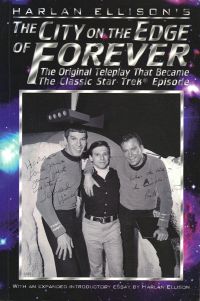Harlan Ellison's The City of the Edge of Forever
Das Buch Harlan Ellison's The City of the Edge of Forever beschäftigt sich mit der Entstehung der Raumschiff Enterprise-Episode Griff in die Geschichte.
Inhalt[Bearbeiten]
- Vom Umschlagtext:
Star Trek fans have searched for years for this rare and elusive original teleplay written by Harlan Ellison over 25 years ago. The City of the Edge of Forever has been surrounded by controversy since the airing of an „eviscerated“ version - which subsequently has been voted the most beloved episode in the series' history. In its original form, The City of the Edge of Forever won the 1966-67 Writers Guild of America Award for best teleplay. As aired, it won the 1967 Hugo Award (the only teleplay ever to do so!)
„Harlan Ellison is a surly young man who has spent years saying awful things about me, while I find him admirable. In fact, 'City…' is my favorite of the original Star Trek series because of the fact that it is a beautiful love story, well told.“ - William Shatner
Afterwords by:
- Leonard Nimoy
- DeForest Kelley
- George Takei
- Peter David
- Walter Koenig
- Dorothy C. Fontana
- David Gerrold
- Melinda Snodgrass
The Controversy Continues
White Wolf Publishing presents, for the first time in unlimited edition trade paperbacks, the unrevised, unadulterated version of Harlan Ellison's award-winning Star Trek script, The City of the Edge of Forever - the spark that incited Ellison's vehement and long-lived feud with late TV producer Gene Roddenberry!
The City on the Edge of Forever is, at its most basic, a poignant love story. Ellison takes the reader on a breathtaking trip through space and time, from the future, all the way back to 1930s America. In this harrowing journey, Kirk and Spock race to apprehend a renegade criminal and restore the order of the universe. It is here that Kirk faces his ultimate dilemma: a choice between the universe - or his one true love.
White Wolf's Borealis Legends imprint makes available this astonishing teleplay as Ellison intended it to be aired. The author's introductory essay (expanded by 15,000 words from the limited edition) reveals all of the details of what Ellison describes as a „fatally inept treatment“ of his creative work. Was he unjustly edited, unjustly accused, and unjustly treated?
